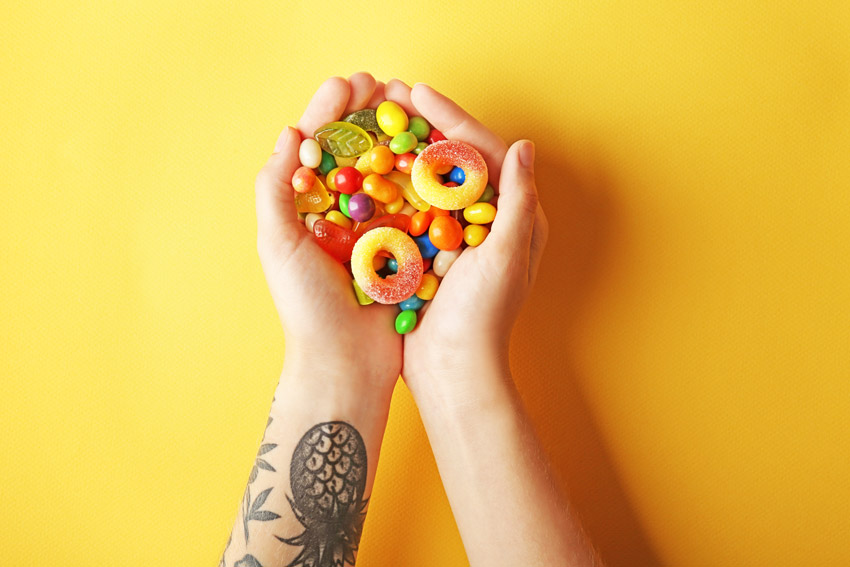You found yourself addicted to alcohol, drugs, and/or prescription medications. You lost control, but you put yourself on a new path by going to treatment. You cleansed your body from the substance, talked with therapists and others in recovery about what led to your addiction, and took back the reins of your life.
A New Craving
You’ve done well in recovery to avoid substances and to deal with cravings for them. But lately you’ve noticed a new behavior, and a different kind of craving. No, it’s not a craving for alcohol or a hard substance. It’s not a craving for gambling, sex, or shopping.
What you crave is something sweet, and you can’t get enough of it: sugar. Perhaps you’ve gotten into the habit of carrying a candy bar or a packet of gummy bears in your purse or pocket. Perhaps you’ve got Swedish Fish stowed away in your glove compartment. Maybe you’ve even been putting on weight recently.
What’s going on here? Sugar didn’t used to be a problem for you. Where have these Hulk-strength sugar cravings come from?
Sugar Cravings & Addiction Recovery
It’s no surprise to scientists, clinicians, and veterans of the addiction recovery process, that sugar cravings frequently surface in recovery. A few studies on this connection between sobriety and sugar suggest that previous substance use primes our brains to respond more excitedly to stimulating compounds like sugar. For someone whose brain has, at one point, grown to expect strong, drug-induced highs, sugar can replicate that feeling of elation in a less intense way.
People once addicted to heroin, for example, often show sugar preferences for years following their treatment, and this spike in sugar intake can have serious consequences. The need for sugar changes their entire diet, and doctors warn us that overdoing it with sweets can lead to a number of health concerns, including diabetes.
Why Sugar?
What is it about sucrose (the scientific name for table sugar) that can lead to addictive behavior?
Sucrose, and other chemical versions of sugar like fructose, glucose, and lactose (yep, the sugars found in dairy products) give everyone–some more than others–a tangible rush. It’s a documented cycle with highs and lows.
First, we eat something sugary and the glucose level in our blood shoots up. Then, not too long after consumption, our sugar levels plummet. Annoyed with the sudden spike and the drop that follows, our body signals for more sugar in order to stabilize itself. This signal feels like a craving, and we’re back to square one.
Sugar can activate our brain’s naturally occurring opiates and endorphins. In this way, sugar leaves us with feelings of happiness, contentment, and satisfaction–at least for a short while. Unfortunately, too much sugar may seriously affect brain chemicals like dopamine and serotonin, giving us too much of the first and blocking proper regulation of the second.
Very simply put, consuming sugar makes us happy for a short period of time in similar ways that the substances we struggled with prior to treatment did.
Outsmarting Our Brains
We know that addiction and substance dependence like to shape-shift. Our brain is super intelligent, and it knows how to find alternatives to pathways it used to follow. If a brain hooked on heroin can follow similar paths with sugar, it will.
The good news is that in as little as 48 hours we can reverse sugar cravings. There are concrete steps we can take to curb the cravings and feel free from the demand of a brain that craves sucrose:
- Eat regularly, and don’t go too long between meals.
- Eat real, whole, nutritious foods. Don’t neglect any of the food groups. If you choose to eat something sugary, do so in moderation.
- Throw some spice in that rice! That’s to say: spices and herbs add a little ring-ding to any food. Spicy foods do wonders for gut health, and they can entertain the brain to the point of cancelling out the urge for sugar.
- Count sheep, catch all the necessary Zs, and sleep well! Proper sleep will regulate your body so that your brain doesn’t feel like it needs sugar.
One gifted writer and recovered alcoholic writes about her experience with sugar in sobriety. Her story explains the spike in sugar and weight that she experienced post-recovery and her triumph in overcoming her glucose monster. She took some healthy steps that ensured this outcome for her.
St. Gregory Can Help
At St. Gregory Recovery Center, we understand that beating an addiction to alcohol or drugs is always a priority and always worth celebrating. Our compassionate, professional staff can help you or a loved one find your path to sobriety. We also understand that substitute addictions can easily rise up in recovery. We offer a variety of resources, including nutritional education, to support you as you navigate the cravings you might face in recovery.







